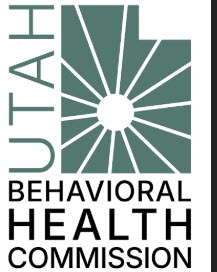Utah Behavioral Health Commission

The Behavioral Health Commission has released a draft five-year behavioral health strategic plan for the State of Utah. The Commission is hosting two listening sessions to hear community input on the plan at the Multi-Agency State Office Building (Room 1020 A-B-C), located at 195 N. 1950 W. in Salt Lake City. Community members can attend in person or virtually:
-
Monday, June 2, 10:00 - 11:30 am: Access recording
-
Monday, June 9, 5:00 - 6:30 pm: Access recording
Please register for these sessions in advance. You can also share your input through this online form. We hope you'll join us to share your perspective on Utah's priorities in behavioral health!
Utah Crisis Line
Call 988
In crisis? Call the Utah Crisis Line for immediate, free, confidential support. 24 hours, 7 days a week
Do you have a youth who needs urgent help? (Stabilization and mobile response page)
Upcoming Meetings
| Date and Time | Virtual Meeting Details | In-Person Meeting Location | Meeting Materials |
|---|---|---|---|
| Thursday, July 17, 2025 1:00 – 3:00 p.m. | Utah State Capitol, Senate Room 210 | ||
| Thursday, August 21, 2025 1:00 - 3:00 p.m. | Utah State Capitol, Senate Room 210 | ||
| Thursday, September 18, 2025 1:00 – 3:00 p.m. | Utah State Capitol, Senate Room 210 | ||
| Thursday, October 16, 2025 1:00 – 3:00 p.m. | Utah State Capitol, Senate Room 210 | Thursday, November 20, 2025 1:00 - 3:00 p.m. | Utah State Capitol, Senate Room 210 |
| Thursday, December 18, 2025 1:00 – 3:00 p.m. | Utah State Capitol, Senate Room 210 |
Past Meetings
| Date and Time | Virtual Meeting Details | In-Person Meeting Location | Meeting Materials | ||||||||||||||||||||||||||||
|---|---|---|---|---|---|---|---|---|---|---|---|---|---|---|---|---|---|---|---|---|---|---|---|---|---|---|---|---|---|---|---|
| Thursday, June 19, 2025 1:00 – 3:00 p.m. | Utah State Capitol, Senate Room 210 | ||||||||||||||||||||||||||||||
| Monday, June 9, 2025 5:00 – 6:30 p.m. | | Multi-Agency State Office Building (Room 1020 A-B-C) |
195 N. 1950 W. in Salt Lake City
|
|
Statutory Responsibilities 26B-5-703
To fulfill the Commission's purpose, the Commission shall:
- establish a shared vision across public and private sectors for improving Utah's behavioral health systems;
- make recommendations, including policy recommendations, and advise the governor, executive branch agencies, and the Legislature on matters pertaining to behavioral health;
- provide feedback on proposed bills, rules, policies, and budgets relating to behavioral health;
- encourage participation in the Commission's work by individuals and populations directly impacted by behavioral health issues, including family members of individuals with behavioral health issues;
- engage private sector payers, providers, and business and employer groups in the commission's work;
- continually review and revise the Master Plan as appropriate;
- identify priorities and lead efforts to implement and advance those priorities by coordinating and collaborating closely with public and private persons throughout the state;
- identify areas where innovation is necessary to improve behavioral health access and care;
- cooperate with the Utah System of Higher Education, the State Board of Education, the Division of Professional Licensing, the Utah Health Workforce Advisory Council, and the Department of Health and Human Services to oversee the creation and implementation of behavioral health workforce initiatives for the state;
- collaborate with the Utah State Hospital, the Department of Corrections, county jails, and the Department of Health and Human Services;
- oversee coordination for the funding, implementation, and evaluation of suicide prevention efforts described in Section 26B-5-611;
- develop methods or models for implementing and coherently communicating cross-sector strategies;
- hold the state's behavioral health systems accountable for clear, measurable outcomes; and
- maintain independence from the Department of Health and Human Services and the governor such that the Commission and its committees are able to provide independent advice and recommendations, especially regarding proposed bills and policy considerations.
Membership
The Commission is composed of the following 11 members:
|
Description |
Appointed Member |
|
Individual who has lived experience with a substance use disorder |
Evan Done |
|
Individual who has lived experience with a mental disorder |
Julie Hardle |
|
Individual who represents families of individuals with behavioral health issues |
Ally Isom (Chair) |
|
Individual who represents state behavioral health agencies |
Tracy Gruber |
|
Individual who represents major healthcare systems |
Tammer Attallah (First Vice Chair) |
|
Individual who represents private acute care providers |
Jordan Sorenson |
|
Individual who represents private outpatient providers |
Adam Cohen |
|
Individual who represents county behavioral health authorities |
Mike Deal |
|
Individual who represents rural communities |
Kyle Snow (Second Vice Chair) |
|
Individual who represents large employers |
Dr. James Ashworth |
|
Individual who represents historically underrepresented populations |
Elaine Navar |
Subcommittees of the Utah Behavioral Health Commission:
Behavioral Health Crisis Response Committee: Conducts studies and makes recommendations for behavioral health crisis needs in Utah, including crisis line practice and needs, the operation of the statewide 988 hotline, and standards for statewide mobile crisis outreach teams.
Statewide Suicide Prevention Committee: Gathers, monitors, and analyzes trends, data, research, and systems to identify prevention, intervention, and postvention needs and develop a statewide plan to reduce suicidal behaviors and promote life quality equitably.
Utah Substance Use and Mental Health Advisory Committee (USAAV+): Recommends and coordinates the creation, dissemination, and implementation of statewide policies to address substance use and mental health disorders.